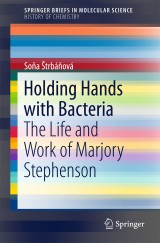Details

Holding Hands with Bacteria
The Life and Work of Marjory StephensonSpringerBriefs in Molecular Science
|
64,19 € |
|
| Verlag: | Springer |
| Format: | |
| Veröffentl.: | 18.05.2016 |
| ISBN/EAN: | 9783662497364 |
| Sprache: | englisch |
Dieses eBook enthält ein Wasserzeichen.
Beschreibungen
<p>This biographical brief outlines the remarkable life and career of British biochemist, Marjory Stephenson (1885-1948). In nine concise chapters, Štrbáňová describes Stephenson's scientific accomplishments and sets these against the socio-political challenges of the time. Stephenson played an important role in the development of biochemistry and molecular biology. She was one of the first scientists to use microorganisms as models for research into cellular biochemical processes and their regulation. Later she went on to coin the term chemical microbiology, which was communicated in her monograph and textbook "Bacterial Metabolism" (1930-1949). Stephenson also actively participated in the establishment of the institutionalized interdisciplinary field of general microbiology which integrated research into diverse forms of microorganisms at various levels of organization. Alongside these scientific achievements, Štrbáňová outlines Stephenson's constant battle with practices of undeclared discrimination, her important role as one of the first women science managers and organizers, and her influential position within the scientific community. A scientist of great merit and a role model to women scientists of all disciplines, the life of Marjory Stephenson is of interest to biochemists, molecular biologists, historians of the chemical and biological sciences, and women scientists of all generations.</p>
<p>Early Years.- Becoming Hopkins’ Associate.- Fruitful Years: What Alice Found in the Microbes.- Between the Medical Research Council and the Biochemistry Department.- The Rise of Nazism in Germany and the Second World War.- Post-war Activities: Recognition and Honours.- From Chemical Microbiology to General Microbiology.- Stephenson’s personality.- Conclusions: What is Left Behind.....- Supplements.</p>
Soňa Štrbáňova is associate professor and research scientist at the Centre for the History of Sciences and Humanities (Institute for Contemporary History of the Academy of Sciences of the Czech Republic). She graduated in biochemistry at the Prague Charles University Faculty of Mathematics and Physics, and received her Ph.D. degree in biology at the Institute of Microbiology of the Czechoslovak Academy of Sciences. <div><br/></div><div>In 1976, she professionalized in history of science. Her historical research focuses on the nineteenth- and twentieth-century history of chemistry, biochemistry and biotechnology; science national style, and institutionalization and communication networks in modern science. She has written, among others, the books Who Are We?(1978), and (with J. Janko) Science in Purkinje’s Time (1988). She has published about 300 scientific articles and edited several volumes and one encyclopedia, among them recently (with I. Stamhuis and K. Mojsejová) Women Scholars and Institutions, 2004; (with B. Hoppe and N. Robin) International Networks, Exchange and Circulation of Knowledge in Life Sciences 18th to 20th Centuries, (Archives international d’ histoire de sciences, 2006). She has co-edited with A. Kildebaek Nielsen the monograph Creating Networks in Chemistry; The Founding and Early History of Chemical Societies in Europe (Royal Society of Chemistry, Cambridge 2008) and with A. Kostlán the encyclopedia One Hundred Czech Scholars in Exile (Academia, Prague 2011) and the conference proceedings Scholars in Exile and Dictatorships of the 20th Century (Prague 2011) . <br/><br/>Štrbáňova is Past President of the European Society for the History of Science, Effective Member of the International Academy of History of Science, member of the Czech National Committee for History of Science and Technology, member of the IUHPS/DHST Commission Women in Science, and member of the EuCheMS Working Party on History of Chemistry. She has received several awards,among them in 2012, the Medal for Contribution to History of Science of the Russian Academy of Sciences and Prize of the Academy of Sciences of the Czech Republic. </div>
This biographical brief outlines the remarkable life and career of British biochemist, Marjory Stephenson (1885-1948). In nine concise chapters, Štrbáňová describes Stephenson's scientific accomplishments and sets these against the socio-political challenges of the time. Stephenson played an important role in the development of biochemistry and molecular biology. She was one of the first scientists to use microorganisms as models for research into cellular biochemical processes and their regulation. Later she went on to coin the term chemical microbiology, which was communicated in her monograph and textbook "Bacterial Metabolism" (1930-1949). Stephenson also actively participated in the establishment of the institutionalized interdisciplinary field of general microbiology which integrated research into diverse forms of microorganisms at various levels of organization. Alongside these scientific achievements, Štrbáňová outlines Stephenson's constant battle with practices of undeclareddiscrimination, her important role as one of the first women science managers and organizers, and her influential position within the scientific community. A scientist of great merit and a role model to women scientists of all disciplines, the life of Marjory Stephenson is of interest to biochemists, molecular biologists, historians of the chemical and biological sciences, and women scientists of all generations.
Meticulously documents the remarkable life and career of British biochemist Marjory Stephenson Highlights the achievements of one of the founders of modern biochemistry Serves as an inspiration to women in science today Includes supplementary material: sn.pub/extras
Diese Produkte könnten Sie auch interessieren:

Pseudomorphe Synthese und isomorphe Substitution von mesoporösen MCM-41-Materialien

von: Julia Patzsch

19,99 €

Technische Methanolsynthese im Versuchsstand: Heterogene Katalyse bei der Herstellung von Methanol

von: Karsten Müller

19,99 €














